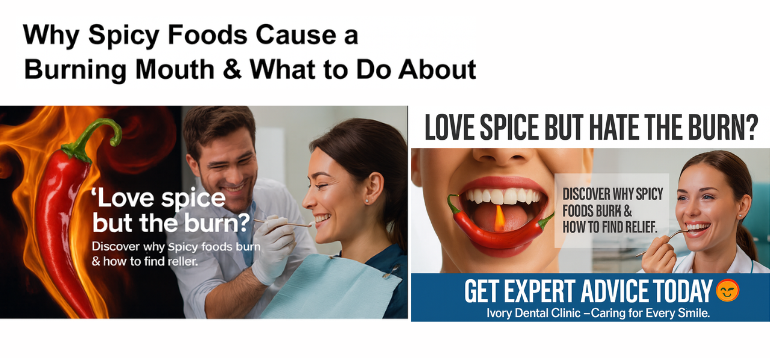Why Spicy Foods Cause a Burning Mouth & What to Do About It
Experiencing a burning sensation in the mouth after eating spicy foods is common, but for some, it can become a frequent or severe issue. While capsaicin, the active compound in chili peppers, is the main culprit, persistent burning may indicate an underlying oral health issue. Understanding the causes and remedies is key to maintaining oral comfort.
Why Spicy Foods Cause Burning
Pain receptors in your mouth bind to capsaicin and send signals to the brain, which interprets them as heat or a burning sensation. This reaction is normal for most people. However, certain conditions can amplify the sensation or make it painful:
Factor: How It Contributes
| Factor | How It Contributes |
|---|---|
| Oral Lichen Planus | Inflamed lesions can react strongly to spicy foods |
| Oral Leukoplakia | White patches may become irritated and sensitive |
| Burning Mouth Syndrome | A chronic condition heightens the burning sensation |
| Dry Mouth (Xerostomia) | Lack of saliva increases oral sensitivity |
| Mouth Ulcers or Lesions | Direct irritation causes sharp pain |
| Gum or Tooth Infections | Inflamed tissue reacts to heat and spices |
Identifying the underlying cause is essential for effective treatment.
How Dentists Help
At Ivory Dental Clinic, Dr. Vishwas Madan provides thorough evaluation and treatment for patients experiencing burning sensations from spicy foods.
Diagnostic Approach:
- Medical and Dental History: Understanding dietary habits, medications, and systemic conditions.
- Oral Examination: Inspecting for lesions, ulcers, or abnormal tissue.
- Specialized Tests: Biopsy, laser diagnostics, or lab tests for conditions like oral lichen planus or leukoplakia.
Pricing Overview for Common Treatments:
| Procedure | Purpose | Price (INR) |
|---|---|---|
| Biopsy (OLP / Leukoplakia) | Confirms tissue abnormalities | ₹8,800 |
| Laser Therapy | Reduces inflammation and promotes healing | ₹19,800 |
| Therapeutic Injections | Controls severe flare-ups | ₹4,400 per visit |
| Preventive Consultation | Identifies triggers and provides dietary or customized adjustments | Customized |
Treatment Options
After identifying the cause, dentists provide targeted treatment that relieves symptoms.
- Topical Medications: Corticosteroid gels and mouth rinses soothe irritation.
- Laser Therapy: Reduces inflammation and promotes tissue healing.
- Injections: For severe flare-ups, especially in chronic conditions.
- Dietary Guidance: Avoiding overly spicy, acidic, or rough-textured foods.
- Hydration & Saliva Substitutes: Helps in cases of dry mouth.
At-Home Remedies
Patients can adopt simple habits at home to manage and prevent burning:
- Rinse the mouth with cool or slightly warm water after meals.
- Avoid foods that trigger irritation, including highly spicy or acidic items.
- Maintain good oral hygiene with soft-bristle toothbrushes and mild toothpaste.
- Stay hydrated to keep the mouth moist and reduce sensitivity.
- Manage stress, as it can exacerbate burning sensations in some patients.
When to See a Dentist
Consult a dental professional if:
- Burning persists for more than two weeks
- Pain interferes with eating, speaking, or daily life
- White or red patches, ulcers, or lesions appear
- Discomfort worsens or is accompanied by swelling or bleeding
Early intervention ensures proper diagnosis and effective treatment.
Conclusion
A burning mouth after eating spicy foods is usually temporary; however, frequent or severe burning may signal underlying oral conditions, such as oral lichen planus, leukoplakia, or burning mouth syndrome. Timely evaluation by a dentist is essential to prevent complications and manage symptoms effectively.
Ivory Dental Clinic, led by Dr. Vishwas Madan, offers advanced diagnostics, laser therapy, therapeutic injections, and personalized care to help patients manage burning sensations. With professional treatment and home-care strategies, patients can enjoy their meals comfortably without pain.
Managing oral discomfort effectively ensures a healthy mouth and a better quality of life.


